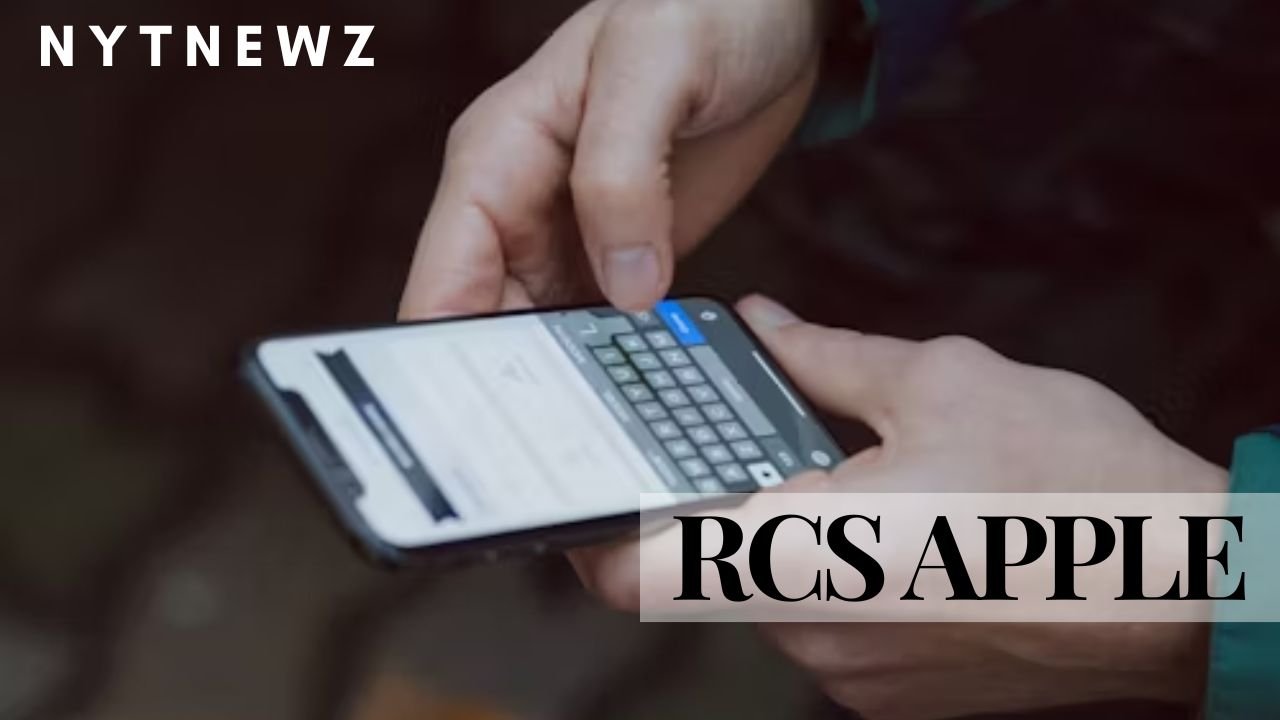RCS Apple: Next Step in Messaging Evolution
RCS Apple is set to fully implement support for Rich Communication Services (RCS) in its Messages app with the release of iOS 18 in 2024. This enhancement is set to improve interoperability between iPhone and Android devices. A remarkable evolution in RCS Apple messaging talent. This article offers an in-depth analysis of RCS Apple’s adventure with RCS adoption, its implications, capabilities, and prospects.
Path to RCS Adoption
For years, Apple resisted adopting RCS, the high-end messaging protocol developed to replace SMS. Apple CEO Tim Cook initially downplayed the demand for RCS, saying in 2022 that it was not a priority for the agency. However, various factors contributed to RCS Apple’s change in stance, primarily regulatory pressures and the need for better interoperability between iOS and Android devices.
What is RCS?
Rich Communication Services (RCS) is an enhancement to conventional SMS messaging that is well-known, offering features that include superior photo and video sharing, study confirmations, writing indicators, and more robust institution chats. Unlike SMS, which works over cellular networks, RCS can feature cellular and Wi-Fi networks, offering a more seamless and enriched messaging experience.
Security and privacy
While RCS improves many components of messaging, it comes with some privacy concerns. Unlike iMessage, which provides end-to-end encryption, RCS Apple currently does not provide this level of security by default. Google’s implementation of RCS is to provide full encryption for one-on-one chats, however, the RCS Universal Profile followed by Apple does not yet support this feature. Apple has indicated that it plans to work with the GSM Association to improve encryption requirements in Destiny updates.
Regulatory pressures
RCS Apple’s decision to adopt RCS Apple was motivated primarily by regulatory bodies, particularly within the European Union. The EU is pushing for greater interoperability between messaging systems to save monopolistic practices and ensure users are not locked into an unmarried ecosystem. By adopting RCS, Apple is adapting to these regulatory needs, which could help it avoid criminal challenges and fines.
Global implementation
The implementation of RCS is not without challenging situations. For RCS to fully characterize both the sender’s device and the recipient’s device should keep the log and its companies should additionally assist it. In the United States, most major carriers such as Verizon, AT, T, and T-Mobile have already implemented RCS, paving the way for a smoother rollout. However, in different regions, local companies will want to implement RCS Apple so that the benefits are reflected globally.
Future prospectuses
RCS Apple’s adoption of RCS represents a significant step toward unifying messaging across special structures. This flow is expected to spur similar innovations and upgrades within the RCS protocol, particularly in terms of security and encryption. RCS Apple’s collaboration with the GSM Association and various enterprise players is likely to cause continuous upgrades in messaging.
Evolution of RCS Technology
Rich Communication Services (RCS) have come a long way given their inception by way of the GSM Association. Initially, RCS Apple confronted several hurdles, along with fragmented implementation and inconsistent carrier assistance, which hindered its adoption. Over time, with full-size backing from primary technology businesses like Google and Samsung, RCS has evolved right into a sturdy messaging protocol. This evolution has added approximately features which include incredible picture and video sharing, study receipts, and superior group messaging abilities, positioning RCS as a comprehensive upgrade over conventional SMS and MMS.
RCS Apple Initial Resistance to RCS
RCS Apple’s adventure towards adopting RCS Apple has been marked through preliminary resistance. In 2022, Apple CEO Tim Cook publicly stated that adopting RCS was no longer a priority for the employer, emphasizing that their cognizance changed to enhancing the iMessage platform. RCS Apple proprietary iMessage gives features like up-to-stop encryption and seamless integration throughout Apple devices, making it a formidable competitor to different messaging platforms. However, growing regulatory pressures and the want for more suitable interoperability with Android gadgets finally led Apple to reconsider its stance on RCS.
Regulatory Influence and Compliance
One of the pivotal factors driving RCS Apple’s decision to undertake RCS is regulatory stress, in particular from the European Union. The EU’s Digital Markets Act objectives are to foster more interoperability among messaging platforms to prevent monopolistic practices and ensure honest competition. By adopting RCS, Apple aligns with those regulatory necessities, potentially avoiding fines and prison-demanding situations. This move is visible as part of RCS Apple’s broader method to illustrate compliance with worldwide regulations and to enhance personal enjoyment across exceptional systems.
Carrier Support and Implementation
The successful rollout of RCS is closely dependent on the carrier guide. In America, major vendors like Verizon, ATT, and T-Mobile have already carried out RCS, facilitating a smoother transition for users. However, the scenario is one of a kind in different regions, wherein nearby companies want to adopt RCS to ensure its functionality. This cooperation among device manufacturers and carriers is crucial for the big adoption of RCS, highlighting the significance of a unified approach inside the telecommunications industry.
Addressing Security Concerns
Despite its severa blessings, RCS has faced grievances for its lack of give-up-to-stop encryption, a characteristic that could be a hallmark of RCS Apple iMessage. RCS The Apple model of RCS will, to begin with, lack this stage of protection, elevating concerns among privacy-aware users. However, Apple has pledged to work with the GSM Association to enhance encryption requirements for RCS. As safety stays a top priority for customers, destiny updates to RCS are expected to deal with these concerns, imparting a greater steady messaging environment.
Impact on the Apple Ecosystem
The introduction of RCS is probably to have a sizable impact on the iMessage platform and the wider Apple surroundings. While iMessage will continue to provide particular functions which include seamless integration with other Apple services and up-to-end encryption, RCS will bridge the space for move-platform conversation. This circulation ought to doubtlessly lessen the exclusivity of iMessage, encouraging more open and inclusive conversation channels. However, it additionally opens up opportunities for Apple to innovate and enhance its messaging services similarly.
Global Adoption Challenges
Despite the ability blessings, the worldwide adoption of RCS faces several challenges. Different regions have varying levels of carrier help and infrastructure, which can affect the rollout. Additionally, users in markets with sturdy preferences for different messaging apps, along with WhatsApp or WeChat, may be slower to adopt RCS. Overcoming these challenges would require concerted efforts from each technology group and carrier,
Integration with Existing Technologies
The integration of RCS with current technology is a complicated but crucial step for its great adoption. RCS Apple ecosystem, recognized for its closed and tightly managed surroundings, poses both challenges and possibilities. Integrating RCS into the Messages app calls for substantial modifications to the backend infrastructure even making sure that the user revel in stays seamless. RCS Apple’s knowledge in developing cohesive software program experiences may be examined because it works to incorporate RCS functions which include read receipts, typing signs, and excellent media sharing into the prevailing framework of iMessage and different Apple offerings.
Business opportunities for messaging
RCS opens new avenues for enterprise messaging. Unlike SMS, RCS supports multimedia and interactive elements, making it an effective tool for collaborating with organizations’ clients. Companies can use RCS to send branded messages, interactive promotions, and customer service communications that consist of pix, movies, and buttons. For Apple, the RCS integration means offering businesses an extremely versatile and effective way to reach iPhone users or tap into new sales streams through commercial enterprise messaging offerings.
Impact on other messaging applications
RCS Apple support for RCS could also have an impact on aggressive messaging app environments. Currently, apps like WhatsApp, Facebook Messenger, and WeChat dominate the messaging space with their rich feature units and motion platform compatibility. With RCS, the RCS Apple Messages app will provide a variety of identical functions, reducing the need for customers to replace multiple apps. This consolidation should cause a shift in the way people use messaging offerings, with Apple Messages likely to transform into a more important hub for conversation.
Developmental and ecosystem implications
RCS Apple’s adoption of RCS presents both challenges and opportunities for developers. Developers will want to ensure that their applications can effectively manage RCS messages, which may also include updating their applications to support new APIs and standards. However, this also opens up opportunities for the development of new forms of applications and offerings that take advantage of the excellent features of RCS. For example, builders should create more interactive and engaging messaging bots, customer support programs, and advertising devices that leverage RCS skills.
Interoperability with other platforms
One of the great blessings of RCS is its ability to improve interoperability between unique systems. With RCS Apple’s adoption of RCS, customers can have more stable messaging through iOS and Android gadgets. This interoperability ensures that features such as extremely good media sharing, study confirmation, and writing indicators are available regardless of the tool used. This flow-through Apple should set a precedent for various technology companies, encourage wider adoption of interoperable standards, and increase general consumer enjoyment across platforms.
Improvements in group communication
Group communication is set up in such a way that Apple will benefit significantly from adopting RCS. The traditional organization of SMS messages lacks most of the features that users have come to expect from today’s messaging apps. RCS addresses these shortcomings by presenting advanced chat organization capabilities, including the ability to see who’s writing, explore receipts from all contributors and more excellent media sharing. This will make conversations within the organization more fluid and interactive, offering users an extra attractive way to communicate in companies.
Challenges in global deployment
Despite the capacity advantages, the global deployment of RCS presents several challenges. Different regions have different levels of infrastructure and operator support, which can affect the effectiveness of RCS. For example, in regions where companies have not yet followed RCS, customers may not be able to take full advantage of its features. In addition, to the fragmented nature of the way the global telecommunications business is done, achieving a uniform rollout would require considerable coordination and cooperation between providers and manufacturing agencies around the world.
The future of mobile messaging standards
The arrival of RCS through Apple marks a full-sized step in the evolution of mobile messaging requirements. As more companies adopt RCS, it may become the de facto messaging standard, replacing SMS and undoubtedly competing with various messaging protocols. This shift could produce an extra unified and feature-rich messaging ecosystem where users enjoy consistent and first-class message stories across unique gadgets and structures. The future of mobile messaging looks promising, with RCS gambling playing a vital role in shaping how people talk.
Conclusion
RCS Apple’s adoption of Rich Communication Services (RCS) signifies a pivotal shift in mobile messaging, bridging the distance between iOS and Android platforms. By integrating RCS, Apple complements interoperability, enriches user enjoyment with capabilities like first-rate media sharing and stepped-forward group chats, and aligns with global regulatory standards. Despite challenges in worldwide rollout and safety issues, RCS Apple’s collaboration with industry leaders and companies units the level for unified messaging surroundings. As RCS keeps evolving, it guarantees to redefine the destiny of mobile conversation, offering customers a greater seamless and engaging messaging experience across devices.




Post Comment